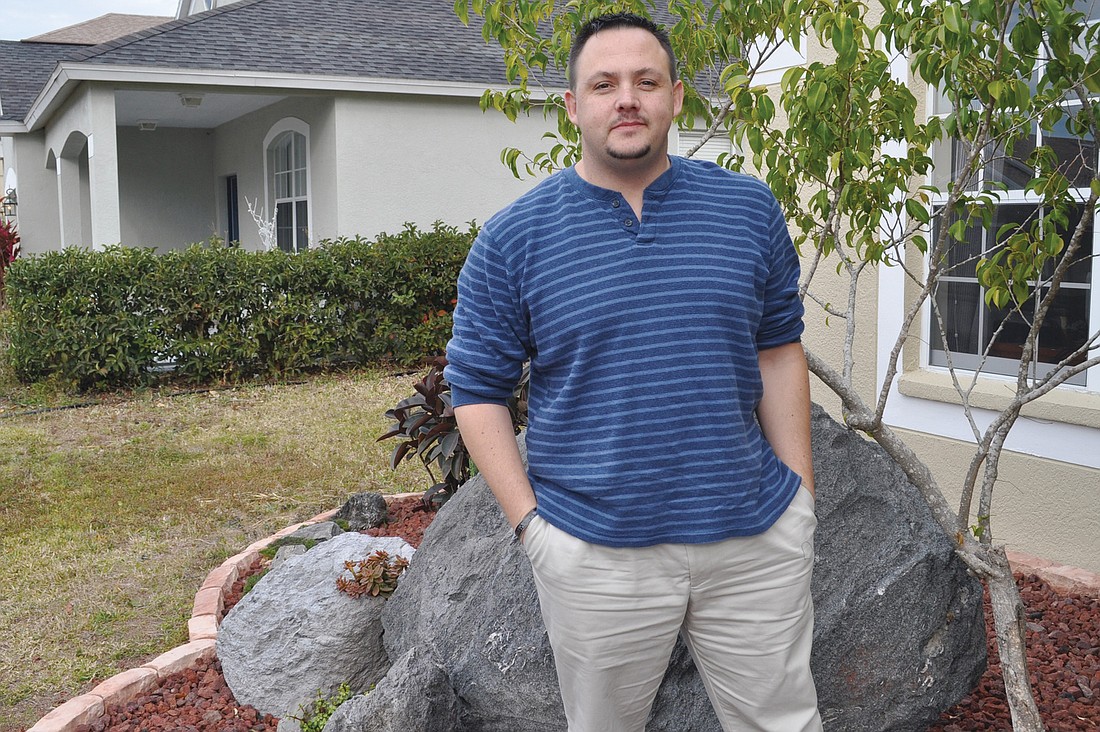- April 16, 2024
-
-
Loading

Loading

EAST COUNTY — It was February 2011 and the text read: “You’re supposed to be here.”
The recipient, a staff sergeant and paratrooper, was supposed to jump out of a plane for a training mission. It was just like any other day. But, this time, he was late, and 1st Sgt. Chris Davis let him know it.
The paratrooper, anxious and sleep-deprived, took a few minutes to respond before sending Davis a reply.
“I’m about to kill myself,” the reply said. Realizing the nature of the text, Davis requested an office meeting with the staff sergeant. Davis convinced him to spare his life.
“As a leader, you have to turn that off,” Davis said. “I’m not your boss anymore. I’m your buddy. As a soldier you’re expected to be strong, tough and have no feelings, but it’s a big deal just to sit down and talk.”
Davis, 34, an East County resident who served as a senior intelligence analyst in the Army for 14 years, has taken that same open-door approach from the battlefields of Iraq and Afghanistan to his new role as veterans job coach at Goodwill Manasota.
Since Jan. 14, Davis has led Goodwill’s new American Veterans and Their Families Initiative. Davis can fulfill its basic mission — to be a comprehensive resource guide for veterans returning to civilian life, helping them find meaningful employment, housing and attaining benefits — better than others.
After watching a “60 Minutes” segment on the dire job market for returning soldiers last year, new Goodwill Manasota CEO Bob Ronsinsky started a pilot version of the veterans program in 2012. The program served 33 veterans in its first year.
He responded to numbers from the Bureau of Labor Statistics, which reported in September a 12.7% unemployment rate for veterans returning from Iraq and Afghanistan, nearly five points higher than the national average at that time.
Davis and Ronsinsky believe overwhelming options and overburdened facilities, such as VA clinics, including local Bay Pines clinics, demand a more community-centered service.
“I’ve found several veterans who didn’t even know they were veterans,” said Davis, who also studies psychology at the University of South Florida Sarasota-Manatee. “They didn’t know they qualified for veteran benefits. A lot have lost hope in the system. They try to take on life by themselves.”
Davis can personalize the care; he has a story to which veterans can relate.
A native of Ellijay, Ga., Davis joined the military in 1996, at 17 years old.
He spent seven tours each in Iraq and Afghanistan.
While serving, Davis did course work over 10 years through five colleges to earn a management degree that never had a tangible impact in his real life.
Davis knew it was time to get out of the military when his son, who just celebrated his sixth birthday this month, asked who he was.
When Davis came home to visit his now ex-wife and son on the occasional Christmas holiday, the child would hide behind his mother’s leg.
About a year from the end of his military career, Davis took part in the Army Career and Alumni Program, an employment service that helps with resumes and cover letters.
Then, on one last tour in Iraq to shut down a base at Camp Ramadi, paranoid questions invaded Davis’ mind: “Do I share my stories?” “Are my skills transferable?” And, most of all, “How do I slow down?”
Davis ended his military career in November 2011.
He moved to Sarasota, where he could live close to his son, who attends school in Parrish.
Davis had the hardest time answering his last question of how to slow down.
He first decided to apply for jobs.
For nearly two months Davis went door-to-door looking for work.
Home Depot called first. It only offered part-time work.
Davis was ready to take the job. But then Lowe’s called.
He was sitting in a Lowe’s orientation when a machining company called and offered a management job paying $14 an hour. He took the job.
But, as Davis gained more power in civilian life, he lost control.
After six months as a manager, a time when he battled lingering Post Traumatic Stress that raged whenever criticism came, Davis was fired.
“I wasn’t accustomed to being told what to do,” Davis said. “I wanted my hands on everything. You never lose that combat instinct. It becomes, ‘I can go to war right now.’ But that is farther and farther apart now.”
By fall 2012, through everyday civilian interactions most take for granted — such as greeting the mailman — Davis had recovered.
He used his GI bill and disability money from the VA to enroll in school full-time to pursue a career in clinical or industrial psychology.
Through Goodwill, Davis reaches out to a broad networking base of veterans he already knows, and he travels to waffle houses, local hospitals and even jails, trying to add to it.
Davis sits down face-to-face with each veteran and first determines his need.
He will either direct the veteran to the proper resource, or take care of the situation himself.
Davis has already pointed homeless veterans to beds dedicated specifically to veterans at the Resurrection House, a faith-based resource center in Sarasota, and to other resources for low-income veterans such as Jewish Family and Children’s Service of Sarasota-Manatee.
Goodwill’s program offers an outlet to help others in ways that were not available to him during his transition.
“I don’t know if my transition was rougher than anyone else’s,” Davis said. “I had a decent network of people. I always had that stability. I want to take that model and make it so for other veterans.”
Contact Josh Siegel at [email protected].